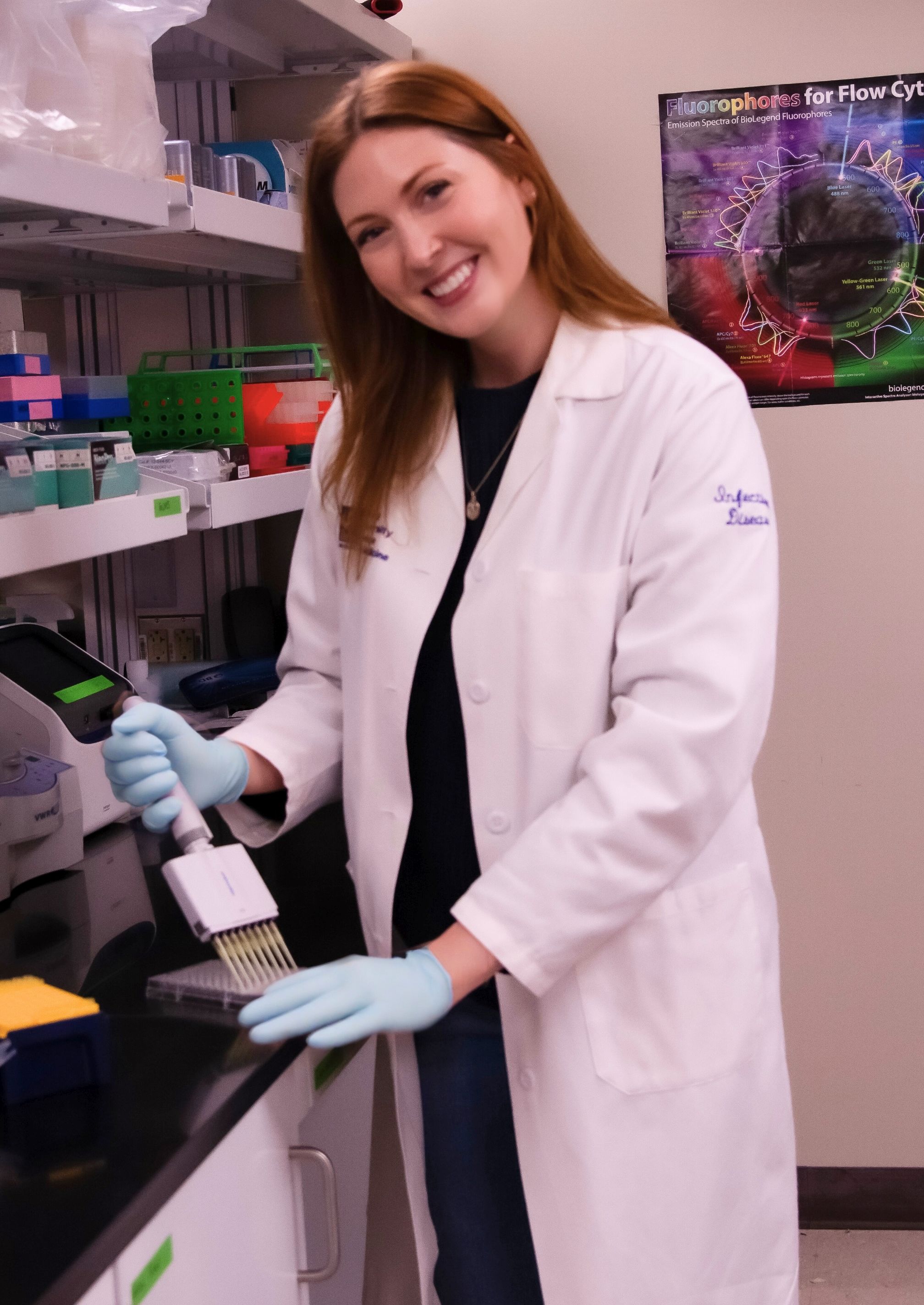
Hometown: Churchville, Pennsylvania
Undergraduate: University of the Sciences, BS in Microbiology
What initially sparked your interest in microbiology and immunology?
My interest in infectious diseases started in childhood, when I became fascinated by historical pandemics. I would watch every documentary I could find on outbreaks like the plague, smallpox and cholera, amazed that microscopic organisms could alter the course of civilizations. My mother, who shared a love for science, nurtured this curiosity and gifted me my first microscope, encouraging me to run small experiments at home. Later, a high school microbiology elective solidified my love and confirmed that this was the area I wanted to dedicate my career to.
How have your academic experiences shaped your decision to pursue research at Drexel?
Growing up in the Philadelphia suburbs, I was always familiar with Drexel University. When I began exploring graduate programs for my PhD, I was drawn to Drexel’s wide range of impactful research opportunities and the strong reputation of its faculty. During the interview process, it quickly became clear that the faculty were both passionate and supportive, which was very important to me. Within the Department of Microbiology and Immunology, I was especially impressed by the breadth of research — from parasitology to HIV to bacteriology — which highlighted the program’s commitment to studying infectious diseases from multiple perspectives. Through the guidance of my mentors and the collaborative environment at Drexel, I’ve been able to grow and excel as a scientist.
What work have you done in Dr. Elias El Haddad’s lab? What have you learned from your time doing that work?
During my time in Dr. Haddad’s lab, I was involved in two major clinical cohort-based studies that formed the foundation of my thesis work. The first was a nationwide study, “Immunophenotyping Assessment in a COVID-19 Cohort (IMPACC),” a longitudinal project that collected clinical and laboratory data from individuals hospitalized with COVID-19 during the early stages of the pandemic. This study followed participants for up to one year post-hospitalization and provided a valuable resource for investigating how early immune events shape long-term memory responses.
In addition, I assisted with a longitudinal cohort study examining immune responses following COVID-19 mRNA vaccination. This project tracked participants for approximately one and a half to two years after receiving booster doses, allowing us to study the durability of vaccine-induced immunity.
Through these experiences, I gained skills in organizing and managing complex clinical datasets, supporting participant recruitment, and performing a range of immunological assays, including ELISA, Luminex and multi-color flow cytometry.
What was the most exciting or surprising finding from your research?
While there is still much work to be done in this area, many of our findings align with published data in the field. Overall, we observed that elevated levels of inflammatory proteins and co-stimulatory molecules during the early stages of COVID-19 were associated with stronger and more durable memory T and B cell responses. We also found that booster doses enhanced both the durability and breadth of memory B cell and antibody responses. Finally, we saw that hybrid immunity — particularly when participants were first infected and then vaccinated — further strengthened cellular memory responses.
How did it feel to be working on COVID-19 research during such an important time?
Working on COVID-19 research during this critical time was both challenging and meaningful. On one hand, there was a sense of urgency and responsibility, knowing that our work on immune responses to infection and vaccination could contribute to a better understanding of the pandemic and inform public health efforts. Drexel was also part of the nationwide IMPACC study, which brought together researchers from multiple universities and fostered a spirit of collaboration during a time when it was most needed. It was motivating to see the real-world impact of our studies, from exploring long-term memory T and B cell responses to examining hybrid immunity. While the fast pace and constant evolution of the pandemic posed unique challenges, the supportive and collaborative environment at Drexel made it possible to push through those obstacles. Overall, it was an experience that not only strengthened my skills as a scientist but also reminded me why I chose to pursue research in microbiology and immunology in the first place.
How has your experience at Drexel shaped your career aspirations? What are your next steps?
My experience at Drexel has been pivotal in my development as a scientist and in solidifying my career goals. Researching immune responses to SARS-CoV-2 infection and vaccination allowed me to gain advanced technical expertise while understanding how scientific findings can inform clinical and public health applications. I also developed a deep appreciation for the importance of clear scientific communication and the role it plays in advancing vaccine development. Professionally, my next step is to transition into the pharmaceutical industry in a role where I can leverage my immunology expertise to support clinical research, contribute to the development of new therapies, and communicate complex scientific insights effectively to both scientific and broader audiences.
What advice would you give to students just starting in the Microbiology and Immunology program? What skills or experiences do you think are most valuable for students interested in research?
My advice for new students is to stay curious and get involved in research early. Hands-on experience builds technical skills, critical thinking and an understanding of how scientific discoveries can impact real-world health. Strong communication skills are also essential, as being able to clearly share your findings is key in research. Take advantage of mentorship, explore different techniques and areas within microbiology and immunology and collaborate with faculty and peers — these experiences will shape your growth as a scientist.
What do you enjoy doing outside of the lab?
Outside of the lab, I enjoy spending time in nature, reading and crocheting, as well as activities like yoga, thrifting and going to concerts. Living in Philadelphia has also been a great experience. The city’s rich culture, diverse restaurants and vibrant local businesses provide endless opportunities to explore and stay inspired.